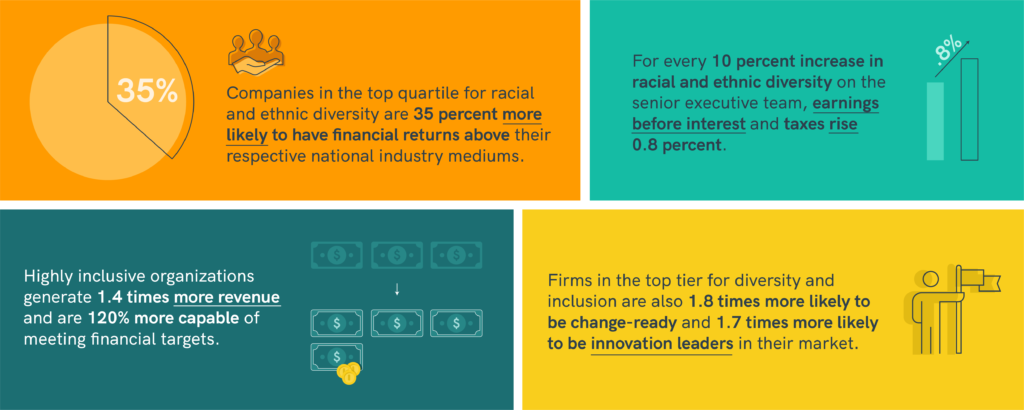
Diversity, Equity and Inclusion as a Business Imperative
As Comunidad Partners founded its organization 13 years ago, the firm didn’t have a business initiative or some epiphany that required organizational change management to embrace diversity, equity and inclusion efforts. Rather, it was intuitively part of the firm’s organizational culture from the onset, as diversity drives better value to an organization.
“DEI is not an elective or optional part of our strategy. It has been and will forever be a business imperative, which helps foster our strong culture and performance,” says Antonio Marquez, Principal and Managing Partner.
“It’s something that’s been important to us from the beginning, and more organizations are finally realizing that in order to be competitive you must instill it into your corporate fabric to be successful long-term,” he says.
The business case for diversity and inclusion
The McKinsey & Company report “Diversity wins: How inclusion matters,” lays out the business case for diversity and inclusion:
- McKinsey’s 2019 analysis finds that companies in the top quartile for gender diversity on executive teams were 25 percent more likely to have above-average profitability than companies in the fourth quartile—up from 21 percent in 2017 and 15 percent in 2014.
- In the case of ethnic and cultural diversity, business-case findings are equally compelling: In 2019, top-quartile companies outperformed those in the fourth one by 36 percent in profitability, slightly up from 33 percent in 2017 and 35 percent in 2014.
- The likelihood of outperformance continues to be higher for diversity in ethnicity than for gender.

“Comunidad Partners’ focus on diversity gives us a competitive performance advantage, and we firmly believe that ownership and management teams should reflect the communities they’re serving to drive optimal value for all stakeholders,” Marquez says.
‘Everyone is a porter’
“Given the communities we serve are diverse, it is imperative to have diverse management teams that have a deeper understanding of the needs, wants, and cultural idiosyncrasies of their customers to drive resident empowerment, elevate communities, and encourage better economic outcomes for all stakeholders,” Marquez says.
On a multifamily property, there are many employees in various positions who keep operations running smoothly. There’s a property manager, maintenance supervisor, leasing agent, among others. The most entry-level position is that of a porter. They ensure that the community is well maintained and clean, including picking up any litter that finds its way on-site.
At Comunidad Partners, we have a belief that is carried throughout the organization: “Everyone is a porter” — to demonstrate our servant leadership and to reinforce the notion that everyone needs to have the humility to do the little things right. Everyone picks up trash when they’re on property, whether it’s a C-suite professional at our firm or someone who just started with us. Leaders set the tone for the corporate culture, and we never ask someone to do something that we’re not willing to do ourselves.”
“It’s a simple phrase that characterizes our company culture,” says Jessica Jimenez, Comunidad Partners’ Vice President of Asset Management. “All team members are important to achieving the goal of a successful property, a new acquisition, a construction project. We stress this equity to our on-site teams as well through their bonus structure — every staff member participates and every member is rewarded. Success requires a team effort.”
Beyond staff equity, property amenities are developed with the intention of making residents feel at home and part of a supportive, inclusive community.
The future of affordable housing
“With the current environment, it is important that Comunidad Partners continues to support and encourage equity and inclusion in housing,” Jimenez says. “We try to seek out minority or women-led companies to work with, and our interview process places a larger emphasis on the person and their EQ or qualitative skills rather than the hard skills or seeking out someone coming from an Ivy League school just because. We do this intentionally to find the best candidate and overcome unconscious bias. We are a diverse group of individuals, and we strive for our culture to reflect that as well.”
With the affordable housing sector becoming increasingly more diverse, it compels the industry to think more deeply about the leaders supporting the communities and residents it serves. Communities want leaders who look like them, think like them and can relate to them, so diverse communities need diverse leaders who can think differently about creating inclusion and equity, and find innovative ways to provide better opportunities for residents and the greater community.

